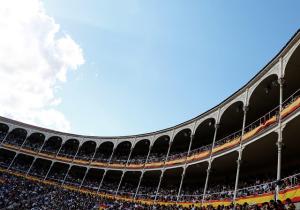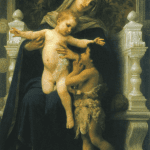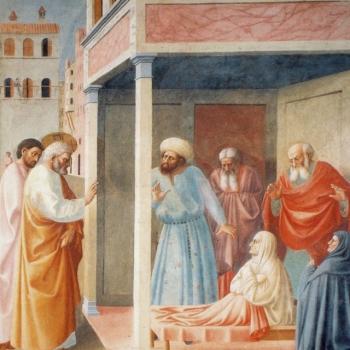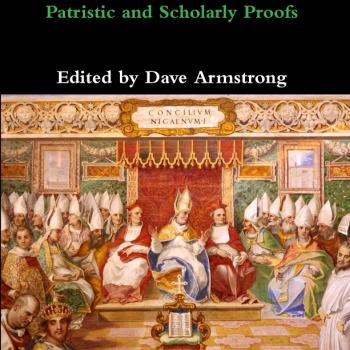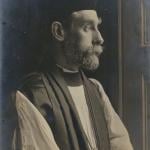Rev. Dr. Jordan B. Cooper is a Lutheran pastor, adjunct professor of Systematic Theology, Executive Director of the popular Just & Sinner YouTube channel, and the President of the American Lutheran Theological Seminary (which holds to a doctrinally traditional Lutheranism, similar to the Lutheran Church – Missouri Synod). He has authored several books, as well as theological articles in a variety of publications. All my Bible citations are from RSV, unless otherwise indicated. Jordan’s words will be in blue.
This is my 11th reply to Jordan (many more to come, because I want to interact with the best, most informed Protestant opponents). All of these respectful critiques can be found in the “Replies to Jordan Cooper” section at the top of my Lutheranism web page.
*****
“Please Hit ‘Subscribe’”! If you’ve received benefit from this or any of my 4,500+ articles, please follow this blog by signing up (email address) on the sidebar to the right, above the icon bar, “Sign Me Up!”: to receive notice when I post a new blog article. This is the equivalent of subscribing to a YouTube channel. Please also consider following me on Twitter / X and purchasing one or more of my 55 books. All of this helps me get more exposure and concretely supports my full-time apologetics work. Thanks so much and happy reading!
*****
This is a response to Jordan’s YouTube video, “The Church Fathers on Prayer to Saints” (11-16-20).
3:43 I [am] going to spend some time in the early Church and go back and ask the question: did the earliest Christians pray to the saints? Is there evidence that the earliest Christians had an understanding of prayer that was broader than prayer as an act of worship directed toward God [and] that there was another kind of invocation of the saints or angels which was not an act of worship?
Clearly so (as to the last sentence), as I hope to demonstrate.
4:32 Did the early Church view prayer as something that could be offered to God as well as the saints, or did they view it in the way that the Reformers would have viewed prayer: as something that is an act of worship that is directed solely toward God?
Catholic invocation of the saints is — by and large — simply asking them to intercede on our behalf to God because we don’t view departed saints as different than other human beings on earth, with respect to simply asking them to pray for us, and we are following James 5 where it is stated that “the prayer of a righteous man availeth much” (KJV), using the example of the prophet Elijah, who could change the weather with his prayers.” These saints have love for us, and they have great power. This is why we ask for their intercession. It’s not an act of worship at all. It’s “going to the holy person to ask them to pray for us.”
Protestants implicitly recognize this all the time when they go to their ministers and pastors, specifically, in order to ask them to pray on their behalf. I think that the premise underneath that act is thinking that the pastor’s prayers would have more effect; i.e., that he is closer to God. Otherwise, they could simply “go straight to God” as a certain Protestant polemic stresses. Catholics agree that we can always and should often pray directly to God. We just think that it’s equally biblical (as I have shown with many Bible passages) to ask relatively more holy people to pray for us, and that this includes perfected saints in heaven, who are more alive than we are, and aware of happenings on the earth.
6:09 if you look at the apostolic fathers [and] ask the question: do they speak of a prayer to the saints? The answer is, no they don’t.
I agree. Anglican patristic scholar J. N. D. Kelly explained that this doctrine was slow to develop:
A phenomenon of great significance in the patristic period was the rise and gradual development of veneration for the saints, more particularly for the Blessed Virgin Mary. . . . Earliest in the field was the cult of martyrs . . . At first it took the form of the reverent preservation of their relics and the annual celebration of their ‘birthday’. From this it was a short step, since they were now with Christ in glory, to seeking their help and prayers, and in the third century evidence for the belief in their intercessory power accumulates. . . . By the middle of the same [4th] century, according to Cyril of Jerusalem, the patriarchs, prophets, apostles and martyrs were commemorated in the liturgy ‘so that by their prayers and intercessions God may receive our supplications’. (Early Christian Doctrines, San Francisco: Harper & Row, fifth revised edition, 1978, 490; my italics)
This, of course, poses no problem for the Catholic view. Doctrines develop at different rates, and among the ones that were slow in the early centuries were the fine points of trinitarianism and the canon of the Bible (with the first complete NT list coming as late as 367 with Athanasius). The doctrine of the communion of saints was almost fully developed (if we are to accept Kelly’s scholarly judgment) before either of those doctrines. If that’s not a problem for Protestantism, neither is this for Catholicism. In fact, I would say (and so would Cardinal Newman: one of Protestant apologists’ favorite “whipping boys”) that this would be fully expected, or at least not surprising.
7:19 We do have to recognize that when we’re looking at the earliest writings, they’re short, they’re brief, [and] they’re not going to cover every aspect of Christian doctrine, so if there were prayers to the saints in Ignatius and Polycarp and figures like that, we don’t have evidence for it. But it’s not like we have some extensive corpus that we’re looking at, so it’s kind of hard to go [to] those letters and say definitively, “well they never mention it so they didn’t believe in it” . . . that’s certainly not enough to say, “therefore no Christians are praying to the saints in this era.”
I completely agree. Well-stated.
Nor does she perform anything by means of angelic invocations, or by incantations, or by any other wicked curious art; but, directing her prayers to the Lord, who made all things, in a pure, sincere, and straightforward spirit, and calling upon the name of our Lord Jesus Christ, she has been accustomed to work miracles for the advantage of mankind, and not to lead them into error.
Context doesn’t particularly help interpret this in any more depth (per our topic). But his use of the terms, “any other” certainly leads me to believe that he was — contrary to Jordan’s take — referring only to wicked “angelic invocations” — which doesn’t logically rule out a possibility of righteous “angelic invocations.” The New Advent site, which contains the 38-volume Schaff edition of the fathers, allows one to easily search them. So I will now search “invocation” in Against Heresies, to see if we can find anything of relevance.
One search result sheds light on what Irenaeus meant above. In Book I, ch. 24, concerning doctrines of Saturninus and Basilides, he states: “These men, moreover, practise magic; and use images, incantations, invocations, and every other kind of curious art.” It seems to be the same sort of biblically forbidden “magic” practices that he referred to in II, 32, 5. Likewise, in the Preface of Book II (1) he refers to beliefs of Gnostics: “their invocations and their mysteries.” Cf. I, 13, 2-3. So Irenaeus sanctioning direct prayer to the Lord doesn’t necessarily rule out asking saints to pray to the same Lord. We know for sure that he is expressing what all Christians agree with: it’s good to pray directly to God. But we don’t see that asking saints to intercede is different than (ultimately) going to God in prayer in the first place.
16:34 Irenaeus . . . says the church does not offer prayers to created things; we don’t invoke created things, we invoke the one who created all things and we do that through our Lord Jesus Christ. So this seems to be very clear evidence very early on.
I don’t see that he was expressing this thought. Here’s the continuation of his section that I cited above:
If, therefore, the name of our Lord Jesus Christ even now confers benefits [upon men], and cures thoroughly and effectively all who anywhere believe in Him, but not that of Simon, or Menander, or Carpocrates, or of any other man whatever, it is manifest that, when He was made man, He held fellowship with His own creation, and did all things truly through the power of God, according to the will of the Father of all, as the prophets had foretold. But what these things were, shall be described in dealing with the proofs to be found in the prophetical writings.
Irenaeus expressed that we can and should pray to God, and that the Gnostics engaged in wicked occultic practices. That much is certain. He didn’t necessarily say that any and all invocations of anyone besides God are always impermissible. Jordan is, I believe, superimposing that onto the text without enough information to do that, in my opinion. I would say that Irenaeus may not have believed in invocation of the saints, but that this section doesn’t prove that. We don’t know enough to know for sure, and Irenaeus died too “early”: at the beginning of the 3rd century: the time in which Kelly observed that “evidence for the belief in [saints’] intercessory power accumulates.”
Jordan addresses Justin Martyr (d. 165), who lived far too early in the development of the communion of saints (by Kelly’s timeline), and Clement of Alexandria (d. c. 215) and Tertullian (d. c. 225), who appeared to reject it. He decided not to deal in this talk with Origen (d. c. 254), about whom two Protestant reference works assert:
In arguing for it [i.e., seeking saints’ help and prayers] Origen appealed to the communion of saints, advancing the view [his footnote: “Esp. in Iesu nave hom. 16, 5″] that the Church in heaven assists the Church on earth with its prayers . . . (Kelly, ibid., 490)
Origen was apparently the first of the Fathers to give the cult of martyrs an express theological foundation. He placed it within the doctrine of the Communion of Saints and taught that the prayer of the saints is efficacious in so far as the faithful follow in their footsteps. (F. L. Cross & E. A. Livingstone, The Oxford Dictionary of the Christian Church, 2nd edition, Oxford University Press, 1983, 1227)
Origen comes right after Tertullian, and in my book on the Church fathers, I documented the espousal of invocation of saints and angels from Cyprian, Ephraem, Basil, Cyril of Jerusalem, Gregory Nazianzen, Gregory Nyssa, Ambrose, John Chrysostom, Jerome, Augustine, Cyril of Alexandria, Pope Leo the Great, Theodoret, and Gregory the Great. I have over seven pages devoted to Augustine’s view of the saints (he being the great “patron saint” of Protestantism), in my book, The Quotable Augustine: Distinctively Catholic Elements in His Theology (2012). On the invocation of saints in particular, he stated:
There was a fellow-townsman of ours at Hippo, Florentius, an old man, religious and poor, who supported himself as a tailor. Having lost his coat, and not having means to buy another, he prayed to the Twenty Martyrs, who have a very celebrated memorial shrine in our town, begging in a distinct voice that he might be clothed. . . . he, walking on in silence, saw on the shore a great fish, gasping as if just cast up, . . . on cutting up the fish, the cook found a gold ring in its belly; . . . (City of God, xxii, 8)
. . . upon recollection of the place in which are deposited the bodies of those whom they love, they should by prayer commend them to those same Saints, who have as patrons taken them into their charge to aid them before the Lord. (On the Care of the Dead, 6)
That’s just one of many.
35:21 The problem with . . . “patristic quote mining”: in especially [a] kind of pop-up Roman Catholic apologetics is, you could do a lot with random citations of fathers taken out of context, and make them sound very Roman Catholic. You can write a whole book that’s just every positive thing any church father says about Peter and stick them all together and make it sound like the papacy, but it’s not, because [if] you actually look at those quotes in context, [they have] nothing to do with the papacy. But if you have a bunch of strung together isolated quotes it can sound like that.
To be fair, Jordan goes on to say that some Protestants do that, too, and he cited an example of a book about the fathers and justification. I agree with him that some on both sides do some very shoddy work with the Church fathers.
36:39 [Lutheran theologian Martin] Chemnitz [1522-1586] . . . does a much more thorough and fair job of dealing with the Church fathers than almost anybody does today.
Funny; that wasn’t my impression at all when I critiqued him back in 2007:
So he’s perfectly content to assert that almost 1500 years needed to pass before anyone properly understood justification in its full Protestant sense; therefore, I submit that the same thing applies (in a much smaller time frame) to the issue of invocation and intercession of saints. If one accepts development in the first place, then one ought to incorporate it across the board in examining any given doctrine. To put it another way, it’s not unusual at all that such a nuanced doctrine as this took a few centuries to fully develop. Many other doctrines (and several that both sides accept), took much longer.
***
*
Practical Matters: Perhaps some of my 4,500+ free online articles (the most comprehensive “one-stop” Catholic apologetics site) or fifty-five books have helped you (by God’s grace) to decide to become Catholic or to return to the Church, or better understand some doctrines and why we believe them.
Or you may believe my work is worthy to support for the purpose of apologetics and evangelism in general. If so, please seriously consider a much-needed financial contribution. I’m always in need of more funds: especially monthly support. “The laborer is worthy of his wages” (1 Tim 5:18, NKJV). 1 December 2021 was my 20th anniversary as a full-time Catholic apologist, and February 2022 marked the 25th anniversary of my blog.
PayPal donations are the easiest: just send to my email address: [email protected]. Here’s also a second page to get to PayPal. You’ll see the term “Catholic Used Book Service”, which is my old side-business. To learn about the different methods of contributing (including Zelle), see my page: About Catholic Apologist Dave Armstrong / Donation Information. Thanks a million from the bottom of my heart!
*
***
Photo credit: The metaphor of Hebrews 12:1, referring to “witnesses” is comparing saints in heaven to spectators in an arena. This photograph is from StockSnap (taken on 30 May 2014) [Pixabay / CC0 public domain]
Summary: Lutheran apologist Jordan Cooper contends that early Church fathers opposed the invocation of saints. For many, that was true. I analyze his reasoning.


